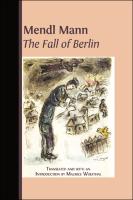The Fall of Berlin
| dc.contributor.author | Mann, Mendl | |
| dc.contributor.author | Wolfthal, Maurice | |
| dc.date.accessioned | 2020-12-15T13:46:42Z | |
| dc.date.available | 2020-12-15T13:46:42Z | |
| dc.date.issued | 2020 | |
| dc.identifier | OCN: 1227240464 | |
| dc.identifier.isbn | 9781800640771 | en_US |
| dc.identifier.isbn | 9781800640788 | en_US |
| dc.identifier.isbn | 9781800640801 | en_US |
| dc.identifier.isbn | 9781800640818 | en_US |
| dc.identifier.isbn | 9781800640825 | en_US |
| dc.identifier.uri | https://library.oapen.org/handle/20.500.12657/43646 | |
| dc.description.abstract | "Mendl Mann’s autobiographical novel The Fall of Berlin tells the painful yet compelling story of life as a Jewish soldier in the Red Army. Menakhem Isaacovich is a Polish Jew who, after fleeing the Nazis, finds refuge in the USSR. Translated into English from the original Yiddish by Maurice Wolfthal, the narrative follows Menakhem as he fights on the front line in Stalin’s Red Army against Hitler and the Nazis who are destroying his homeland of Poland and exterminating the Jews. Menakhem encounters anti-Semitism on various occasions throughout the novel, and struggles to comprehend how seemingly normal people could hold such appalling views. As Mann writes, it is odd that ""vicious, insidious anti-Semitism could reside in a person with elevated feelings, an average person, a decent person”. The Fall of Berlin is both a striking and timelylook at the struggle that many Jewish soldiers faced. An affecting and unique book, which eloquently explores a variety of themes – such as anti-Semitism, patriotism, Stalinism and life as a Jewish soldier in the Second World War – this is essential reading for anyone interested in the Yiddish language, Jewish history, and the history of World War II. " | en_US |
| dc.language | English | en_US |
| dc.subject.classification | thema EDItEUR::J Society and Social Sciences::JB Society and culture: general::JBC Cultural and media studies::JBCC Cultural studies | en_US |
| dc.subject.classification | thema EDItEUR::N History and Archaeology | en_US |
| dc.subject.classification | thema EDItEUR::3 Time period qualifiers::3M c 1500 onwards to present day::3MP 20th century, c 1900 to c 1999 | en_US |
| dc.subject.classification | thema EDItEUR::J Society and Social Sciences::JB Society and culture: general::JBS Social groups, communities and identities::JBSR Social groups: religious groups and communities | en_US |
| dc.subject.classification | thema EDItEUR::5 Interest qualifiers::5P Relating to specific groups and cultures or social and cultural interests::5PG Relating to religious groups::5PGJ Relating to Jewish people and groups | en_US |
| dc.subject.classification | thema EDItEUR::1 Place qualifiers::1D Europe::1DF Central Europe::1DFG Germany | en_US |
| dc.subject.other | autobiography | en_US |
| dc.subject.other | fiction | en_US |
| dc.subject.other | Jewish | en_US |
| dc.subject.other | Red Army | en_US |
| dc.subject.other | Poland | en_US |
| dc.subject.other | Nazis | en_US |
| dc.subject.other | USSR | en_US |
| dc.subject.other | Yiddish | en_US |
| dc.subject.other | anti-semitism | en_US |
| dc.subject.other | Berlin | en_US |
| dc.subject.other | patriotism | en_US |
| dc.subject.other | stalinism | en_US |
| dc.subject.other | second world war | en_US |
| dc.subject.other | Jewish history | en_US |
| dc.subject.other | World War II | en_US |
| dc.subject.other | Yiddish language | en_US |
| dc.subject.other | Eastern Europe | en_US |
| dc.title | The Fall of Berlin | en_US |
| dc.type | book | |
| oapen.identifier.doi | 10.11647/OBP.0233 | en_US |
| oapen.relation.isPublishedBy | 23117811-c361-47b4-8b76-2c9b160c9a8b | en_US |
| oapen.collection | ScholarLed | en_US |
| oapen.pages | 250 | en_US |

